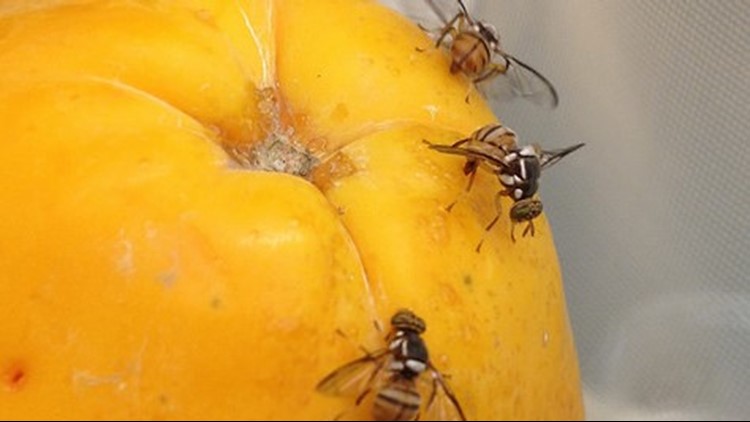Parts of Sacramento and Yolo County were dropped into a quarantine due to an invasive pest, and impacted growers have to get involved with a treatment program to sell their fruit.
Sacramento County officials found 15 Oriental fruit flies, 14 males, and one female, between July 30 and the end of August. Sacramento County Agricultural Commissioner Juli Jensen told ABC10 in a phone interview on Friday that this was evidence of a breeding infestation in the county.
The California Department of Food and Agriculture (CDFA) will be the main authority for treatment and eradicating the pest. To do this, they will be using a special insecticide known as GF-120 Naturalyte.
Until they treat their produce for 30 days, local growers in the quarantine area will not be able to sell whole produce that is targeted by the Oriental fruit fly at the market.
A simple and straightforward eradication
The CDFA uses what’s called the “Male Attractant” technique. Scientists have been able to mimic the biological signal that the flies give out to attract males; that mimic hormone attracts the flies and then the pesticide kills them. The insecticide is called GF-120 Naturalyte.
For street trees and similar surfaces, a small patch of fly attractant is mixed with a small dose of pesticide by crews and is applied about 10 feet off the ground. Farmers apply the treatment themselves and will also be involved in a compliance agreement that state staff will verify was done.
“This approach has successfully eliminated dozens of fruit fly infestations from California over the last several decades,” said CDFA spokesman Jay Van Rein in a Friday email to ABC10.
Immediately after the treatment, the CDFA suggests that children not play near the treated trees or plants and to avoid yard work. The outdoor play areas can be rinsed off after the treatment, and skin and clothing should be washed if contact occurs.
According to Van Rein, this insecticide is approved for use on organic farms and is also available for local farmers to use. He says that any grower in the quarantine area who wants to harvest produce that can serve as the host material for the fruit fly and also move it off the property is required to go through with the treatment. Treatments must continue until all host material is harvested.
GF-120 Naturalyte safety
This insecticide is a combination of a protein bait and spinosad, an organic pesticide.
When the fruit fly ingests this compound, it overstimulates the insect’s nerves and leads to its death. For mammals, tests have indicated that spinosad has little effect, even at high doses.
"It’s produced by a naturally occurring bacterium found in soil," said Van Rein. "It also meets the US Environmental Protection Agency’s requirements for 'reduced risk 'pesticides' because it has been shown to have little impact on human health."
According to CDFA, spinosad has very little health risk to humans when it is applied as instructed. High doses of spinosad show low toxicity on mammals as well, however, it can cause temporary slight eye and skin irritation at high concentrations.
When the compound is applied, the spinosad stays on the plant surface. While a small amount of the pesticide may enter the leaves, it is not distributed to other parts of the plant. Even if the pesticide falls to the ground, the residue is broken down by sunlight or bacteria within a few days to several weeks.
After four hours, the pesticide will have dried. At that time, the produce from plants and trees treated with the pesticide can be consumed, however, they should be washed before being eaten or cooked.
If you feel sick after applying GF-120 Naturalyte, call the California Poison Control System hotline at 800-222-1222 or talk to a physician.
Changes at the farmers market
One of the things that people may notice at the farmers market are the screens and plastic sheets covering produce. These are some of the safeguards that producers are taking to protect their fruits and vegetables from the Oriental fruit fly.
Customers at the market will have to do a little extra work while shopping to help protect the growers at the market and mitigate any potential impacts from the fruit fly. By following the safeguards, producers will be able to take their produce out of the quarantine area safely.
"At our farmers’ markets, you’ll see most sellers covering the host material with netting or plastic," said Van Rein. "Some will erect a tent around their entire stand. These are acceptable forms of safeguarding."
"Produce brought into the quarantine area can leave the area if it has been safeguarded the entire time it is within the quarantine area."



